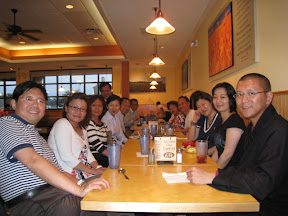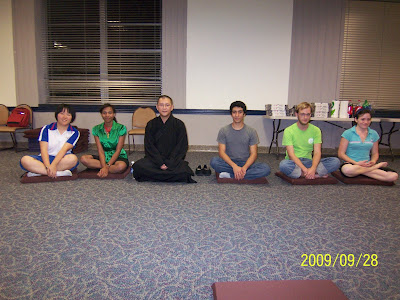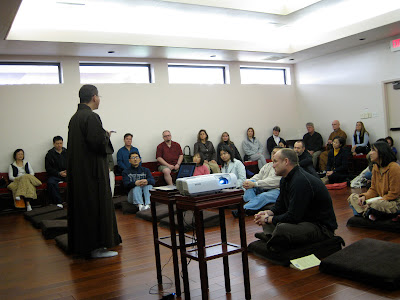
Sutra of the Forty-Two Chapters class came to a conclusion on May 3rd. Several impressive records were set during this nine-class semester. For example, class location had to be changed to accommodate the large number of attendees. On average, the number of weekly attendees exceeded 36. At the end of the term, 28 people received a certificate of completion while 18 students attended all classes.
May 3rd coincidently was also Shifu’s birthday. Current and past students gathered and gave him a surprise birthday party. Shifu expressed his deepest appreciation to both Venerable Jin Hai and Venerable Hung I, and all the students and supporters for the past two years. He was especially grateful of the encouragement and opportunities granted by the two Venerables. Because of their trust and support, he was able to continue his study for the past two years while offering classes at Jade Buddha Temple. Similarity, students were thankful that Shiful would share his teachings while juggling with busy academic schedules. Everyone wished him to complete his degree soon.

Graduation ceremony was held the following week. Venerable Jin Hai and Venerable Hung I were present to give the awards. Eighteen students who maintained a perfect attendance received a black sandalwood wooden fish, completed with a golden-stringed cotton pad. Shifu joked that the unprecedented high level of full attendance must due to everyone’s desire to receive this gift. This phenomenon reflected what the sutra said, “give them what they desire to attract them in, then teach them the dharma.”
After the ceremony, some students shared their reflections. Here are some selected contents:
Student1: This was my first dharma class. I hope I can continue.
Student2: I had never stepped into a temple, let alone taking dharma class. Being a Christian for 40 years, I continued to struggle with things in life and were unable to find an answer. A friend introduced me to this class. I thought I would take it as a philosophy class. However, this class was like a door to a new world. Even though I have not taken the refuge, I have started to think deeper and wilder. I hope I can continue to take Shifu’s class.
Student 3: I am ashamed to say that I have been coming to the temple for many years; however, this was my first dharma class. I was so blessed to be able to attend this class and I have benefited greatly.
Student4: This was my second time taking Shifu’s class. However, my husband challenged me: how come you are leaning the dharma yet you have not yet changed your temper? There are still rooms for improvement!
Student5: I particularly liked how Shufu always pulled us back to focus on the cultivation of our mind. This method can be easily applied to my daily life and I have received great benefits.
Student6: This was my first dharma class. Shiful pointed out in the first class some common pitfalls we parents share today. He advised us to create a positive relationship with our children and respect their own development. At times, we should learn to let go and try not to always make decisions for them from our own angles. My daughter asked me about the class when I returned home. Upon hearing what Shiful said, she eagerly encouraged me to continue taking the class.
Student7: what stayed with me the most is what Shifu asked: what is true happiness: away from suffering is true happiness.
Student8: I have been to the temple for over 20 years and my first dharma class was with Shifu. In the past two years, except for one time I was sick, I have never missed a class. In order to succeed in Shifu’s classes, I began to pick up books and dictionary again. Unfortunately my memory is not as sharp as before, so I can only continue to attend class to make up my own shortcomings.
Student9: I feel I still have yet learned enough. This was my third semester. I was clueless in the first semester. Second semester was a little better. This semester was the best because Shifu’s skillful way of designing the homework. It forced us to read the sutra and review the handout. I often stayed up pass midnight for homework. Two-hour class was too short. I hope Shifu will return soon so we can take more classes.
Student10: I attended Christen schools and requested that my husband accept Jesus before I would marry him. Because my father passed away last year, I came in contact with the temple then. Thank to Shifu’s class, I realized my own misunderstanding about Buddhism and finally had the chance to uncover the real Buddhism. My husband was especially looking forward to the weekly class.
Student11: After two semesters, I can now apply Buddhism in my daily life. I used to change job every other year because I seemed to be able to find faults in everything. After these classes, I began to see people, things, and events with a different light. As a result, I felt more at ease.
A farewell party for Shifu was held the next day at Sweet Tomato.

 With a variety of tasks to complete, college students live a busy and stressful life. Relaxation of mind and body is an efficient way to lessen the burden. But how can we achieve to have a relaxed and peaceful mind? Research has shown that meditation, if practiced appropriately, can serve to reduce stress, adjust mood and increase focus. In the evening of September 28, we’re honored to have Venerable Jian Dan give a lecture on meditation. The new Resident Assistant attended the meditation workshop at Learning Support Services. She thought it’s a good idea to hold a meditation workshop because the one she went was a huge success. She remembered there was a long line outside of the room where the class was held and only a certain amount of people were allowed in because of the amount of space. She had a great experience in Master Jian Dan’s class and she thought she would hold one where a lot more people would come.
With a variety of tasks to complete, college students live a busy and stressful life. Relaxation of mind and body is an efficient way to lessen the burden. But how can we achieve to have a relaxed and peaceful mind? Research has shown that meditation, if practiced appropriately, can serve to reduce stress, adjust mood and increase focus. In the evening of September 28, we’re honored to have Venerable Jian Dan give a lecture on meditation. The new Resident Assistant attended the meditation workshop at Learning Support Services. She thought it’s a good idea to hold a meditation workshop because the one she went was a huge success. She remembered there was a long line outside of the room where the class was held and only a certain amount of people were allowed in because of the amount of space. She had a great experience in Master Jian Dan’s class and she thought she would hold one where a lot more people would come. The class started with students asking some interesting questions, which, as always, showed the students’ curiosity about Buddhism and the practice of meditation. Then the students began to complain about the amount of homework, the tough tests they need to take, and some questions about socializing with other people. As the conversation went, we touched and discussed some more philosophical questions. Where do our sufferings come from? The Venerable explained while gesturing to indicate the difference between expectation levels, “When we have high level of expectation, we’ll feel frustrated if we can’t get to it.” Sufferings come from our mind within, not from external sources. “Wouldn’t you be suffered if you didn’t make the score you wished to get in the exams?”
The class started with students asking some interesting questions, which, as always, showed the students’ curiosity about Buddhism and the practice of meditation. Then the students began to complain about the amount of homework, the tough tests they need to take, and some questions about socializing with other people. As the conversation went, we touched and discussed some more philosophical questions. Where do our sufferings come from? The Venerable explained while gesturing to indicate the difference between expectation levels, “When we have high level of expectation, we’ll feel frustrated if we can’t get to it.” Sufferings come from our mind within, not from external sources. “Wouldn’t you be suffered if you didn’t make the score you wished to get in the exams?”



































